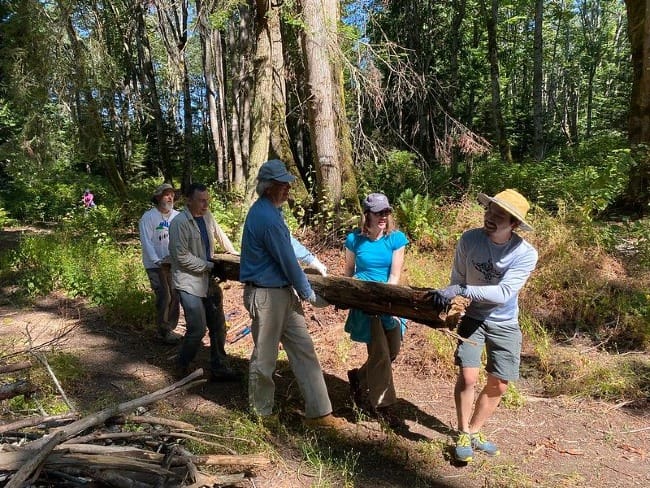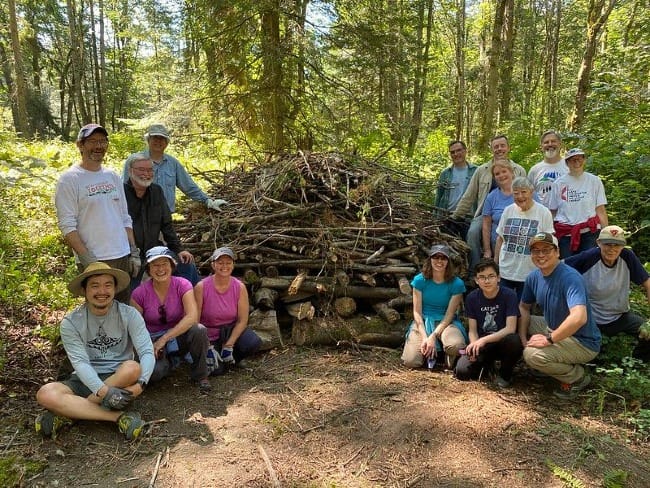A few years ago, I stood at the edge of Circlewood's 40-acre forest with my colleague Forrest Inslee. We were waiting for foresters from the Northwest Natural Resources Group, a non-profit dedicated to helping people like us practice ecological forestry. Heading into the meeting, we were fairly convinced that the best thing we could do to help the forest was leave it alone - after all, we knew nothing about caring for a forest, and it seemed reasonable that leaving it alone would spare it from our ignorance and allow it to grow "as nature intended." We were wrong.
One of the first things our new forester friends told us was that leaving the forest alone was not a good option. They told us that the forest had been heavily impacted by humans - including several clear cuts over the last 200 years - and that the real decision before us was not whether or not to actively manage it, but how to care for it in a way that enabled the forest to flourish. It was a path-shifting moment, and led to our decision to develop, with the help of NNRG, a 30-year care plan that is guiding us as we develop the knowledge and skills of forest keeping.

Two Paths That Lie Before All of US
Since that first meeting, I have learned that our forest was once part of an extensive, old-growth forest supporting a myriad of creatures and indigenous communities, and that European explorers and settlers rapidly clear-cut it to build the cities and ships at the heart of colonial expansion. During this period of history, the forest experienced a shift from one very distinct way of human interaction with the earth to another - from the indigenous way, which had lived in reciprocal relationship with the forest as fellow creatures, to the dominionist way, which lived in hierarchical relationship with the forest as "lords and masters" of the non-human world.
These two paths share a common truth: we are part of nature, in relationship with all that is around and in us, constantly impacting the world and being impacted by it. We cannot ignore the consequences of our action and inaction, nor can we simply "let nature run its course." What we can do is decide what kind of relationship we will have - which path we will choose.
Readers of the Bible recognize that this choice plays a central role right from the start of Genesis, and in many ways frames the whole scriptural story. God creates human beings with the capacity, and the calling, to be in active relationship with the earth, to co-sustain the world with God. Placed in the forest garden called Eden (literally "the Garden of Delight"), the first humans have everything they need to live well and learn to practice their exciting vocation.
Their calling comes with choices and limits; they are told to eat anything from any tree except the one at the center of the garden. God knows they need to grow and mature and are not ready to handle the knowledge and responsibility that will come from eating from this tree. They eat the fruit anyway, fueled by curiosity, discontent, and a promise that this presents a shortcut to becoming more fully like God. So, they take what is not theirs to take, grasping beyond the limits given to them, falsely assuming that to become like God is to be able to exercise power over creation in a way that elevates oneself at the expense of others. They choose the path of dominion, opting for power and privilege rather than service and responsibility. You only have to read another chapter or two of Genesis to know that the results are disastrous.
And you only have to read the news headlines to see that we have continued down the dominionist path. We now live in an age when the repercussions of this path have reached planetary proportions. The most obvious example (though by no means the only one) is the growing reality of climate change. This summer alone has seen multiple extreme drought and flooding events, sometimes in the same location (often called "weather whiplash"). China is experiencing its longest heat wave ever recorded.
We have burned too much oil and coal, lived beyond our limits for too long, continuing to exercise the kind of power that is changing Earth's delicate ecological systems. This is not good news, and it is tempting to believe that we are too far down this path to turn back, tempting to slide into despair and embrace what is often referred to as "doomerism" (see my thoughts on the "doom boom" HERE). But there is good news - changing paths is still possible.
Getting on the Jesus Path
For many Christians, becoming a follower of Jesus has been about having one's personal sins forgiven, trying to love one's neighbor, and looking forward to eternity in heaven. A fuller way to understand Jesus, and what it means to follow him, is in seeing that he makes it possible to follow the path that God originally intended for us at the dawn of creation. Jesus is the way to move from the path of dominion to the path of peace - in fact, he describes himself as "the way" (John 14:6). If we want to follow Jesus down this way, a good place to start is by emulating the pattern of his life as laid out in the great hymn of Philippians 2:5-11:
Let the same mind be in you that was in Christ Jesus,
who, though he existed in the form of God,
did not regard equality with God
as something to be grasped,
but emptied himself,
taking the form of a slave,
assuming human likeness.
And being found in appearance as a human,
he humbled himself
and became obedient to the point of death—
even death on a cross.
Therefore God exalted him even more highly
and gave him the name
that is above every other name,
so that at the name given to Jesus
every knee should bend,
in heaven and on earth and under the earth,
and every tongue should confess
that Jesus Christ is Lord,
to the glory of God the Father.
Jesus did not grasp after power and privilege. He chose to live within the limits of being human. He chose to serve others and sacrifice what was his to give for the good of creation (see Col. 1:15). He is the way off the dominionist path of destruction and onto God's path of peace. This is why he is ultimately exalted as lord of creation.
Our Daily Choice
Each day, we choose between these paths. I'm encouraged by the growing number of people choosing the path of peace, opting for ways to live that allow creation to flourish. Some of these people are consciously on the way of Jesus, others are not; all of them encourage me and motivate me to keep going down the right path.
As more of us move in this direction, it gets easier - in fact, it is a path meant to be travelled together.

A few weeks ago, a group from Lake Washington United Methodist Church came out to see the forest and construct a wildlife habitat from the slash left over from a forest thinning project we did as part of our care plan. They walked the paths together and made something that will enhance the life of the forest - I've already seen wildlife using the pile. It was a moment that filled me with gratitude for how far we've come in the few years since that first meeting at the edge of the forest - and for those who are now walking with us.

With you on the Way,
James
Want to share your thoughts with other readers? Post a comment below.
Like what you are reading? Consider joining our supporter community, The Circlewood Stand.